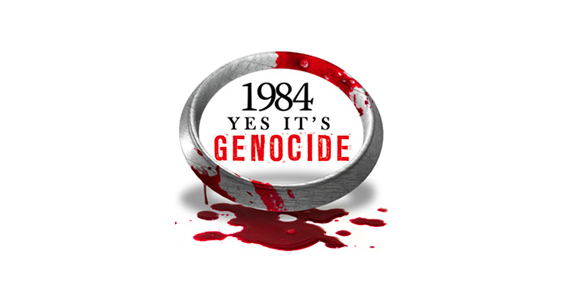Sikh Genocide 1984 » Sikh News
Delhi High Court Stops at “Crimes Against Humanity” in CBI v Sajjan Kumar
December 19, 2018 | By Parmjeet Singh
For past three decades the event of 1984 Sikh genocide were labeled as “riots” by the Indian state, more specifically the government, judiciary and the media propagated that the 1984 killings of Sikhs were “riots”. State patronage to the culprits and impunity for the crimes committed against the Sikhs in 1984 are established fact now. For the past few years the Sikhs, in general – and Sikh diaspora in particular, have strongly challenged the Indian narrative and asserted that the 1984 massacres of the Sikhs were in fact “genocide”.

1984 Yes Its Genocide | Image used for representational purpose only
The state assembly of Delhi passed a motion in 2015 condemning the November 1984 violence against the Sikhs as “genocide”. Various state/provincial authorities in Canada and United States (USA) have officially recognised the fact of 1984 Sikh Genocide. Many city councils in USA have also issued proclamation recognising the fact of 1984 Sikh Genocide.
Recently, the Delhi High Court in its judgement in “SHAMBIR & ORS v. STATE (2018)” said: “The large scale rioting, mob violence, arson, plunder, genocide and looting has been duly proved and established”.
In its judgement in CBI v. Sajjan Kumar (2018) case the Delhi High Court discussed the crimes of “Crimes Against Humanity” and “Genocide” in para 367. The court also referred to joint declaration by the governments of Britain, Russia and France on 28th May 1915; the International Military Tribunal (IMT) that was formed after the World War II; the International Criminal Tribunal for the former Yugoslavia (ICTY); the International Criminal Tribunal for Rwanda (ICTR); and the International Criminal Court to highlight that existence of specific categories of mass crimes called “Crimes Against Humanity” and “genocide”.
The court rightly pointed that the Indian law does no recognise mass crimes of “Crimes against Humanity” and “Genocide” nor provide for their prevention and punishment.
“Neither “crimes against humanity” nor “genocide” is part of our domestic law of crime. This loophole needs to be addressed urgently”, the court notes in para 368. (xii) of the judgement in Sajjan Kumar case.
But when it actually came to the 1984 Sikh Genocide, the Indian court stopped a step behind and termed it as “Crimes against Humanity” only.
In para 367.1. of its judgement the High Court says “The Court would like to note that cases of the present kind are indeed extraordinary and require a different approach to be adopted by the Courts. The mass killings of Sikhs between 1st and 4th November 1984 in Delhi and the rest of the country, engineered by political actors with the assistance of the law enforcement agencies, answer the description of “crimes against humanity” …”.
Again in para 368 (v) of the judgement the court says: “The mass killings of Sikhs between 1st and 4th November 1984 in Delhi and the rest of the country, engineered by political actors with the assistance of the law enforcement agencies, answer the description of „crimes against humanity‟. Cases like the present are to be viewed in the larger context of mass crimes that require a different approach and much can be learnt from similar experiences elsewhere”.
It is clear from these paras that the Delhi High Court accepts that the crimes committed against Sikhs in 1984 were not of ordinary nature and in fact they were serious mass crimes “engineered by political actors with the assistance of the law enforcement agencies”.
The court also discussed the difference between “Crimes against Humanity” and “Genocide” and rightly notes that its the specific intent “to destroy, in whole or in part, a national, ethnical, racial or religious group” which turns the crime of “crimes against humanity” into genocide.
In its judgement the court just stopped at terming 1984 Sikh Genocide as “Crimes Against Humanity” and did not went further to acknowledge that the crimes committed in 1984 actually amount to “genocide”.
The Delhi High Court’s remarks that the crimes committed against Sikhs in November 1984 were “crimes against are correct but incomplete because every “genocide” are defacto “crimes against humanity” but when a crime of “crimes against humanity” is committed with intent to destroy the targeted group in whole or in part, it amounts to genocide.
Delhi High Court’s observation is incomplete because it does not takes notice of the fact that in 1984 the perpetrators of “Crimes against Humanity” targeted Sikhs with intent to destroy them.
It is not the case that the court applied the judicial test for genocide on 1984 violence against the Sikhs and then rejected it; rather the court simply did not proceed further after acknowledging that the 1984 were “crimes against humanity”. Therefore, the court’s observation is incomplete.
Witness accounts of genocide survivors along with factual details of circumstances that prevailed during the 1984 Sikh genocide clearly establish the fact of 1984 Sikh Genocide.
⊕ RECOMMENDED VIDEO:
To Get Sikh Siyasat News Alerts via WhatsApp:
(1) Save Our WhatsApp Number 0091-855-606-7689 to your phone contacts; and
(2) Send us Your Name via WhatsApp. Click Here to Send WhatsApp Message Now.
Sikh Siyasat is on Telegram Now. Subscribe to our Telegram Channel
Related Topics: 1984 Sikh Genocide, 1984 Yes It’s Genocide, Delhi High Court, November 1984, Sajjan Kumar




